| | | | | | | Presented By Celadon Books | | | | Axios World | | By Dave Lawler ·Oct 29, 2020 | | Welcome back to Axios World. - We're diving in tonight (1,619 words, 6 minutes) on a key pre-election question: Would a President Biden be able to salvage the nuclear deal with Iran?
New arrival? Subscribe here. | | | | | | 1 big thing: Can Biden save the Iran deal? | 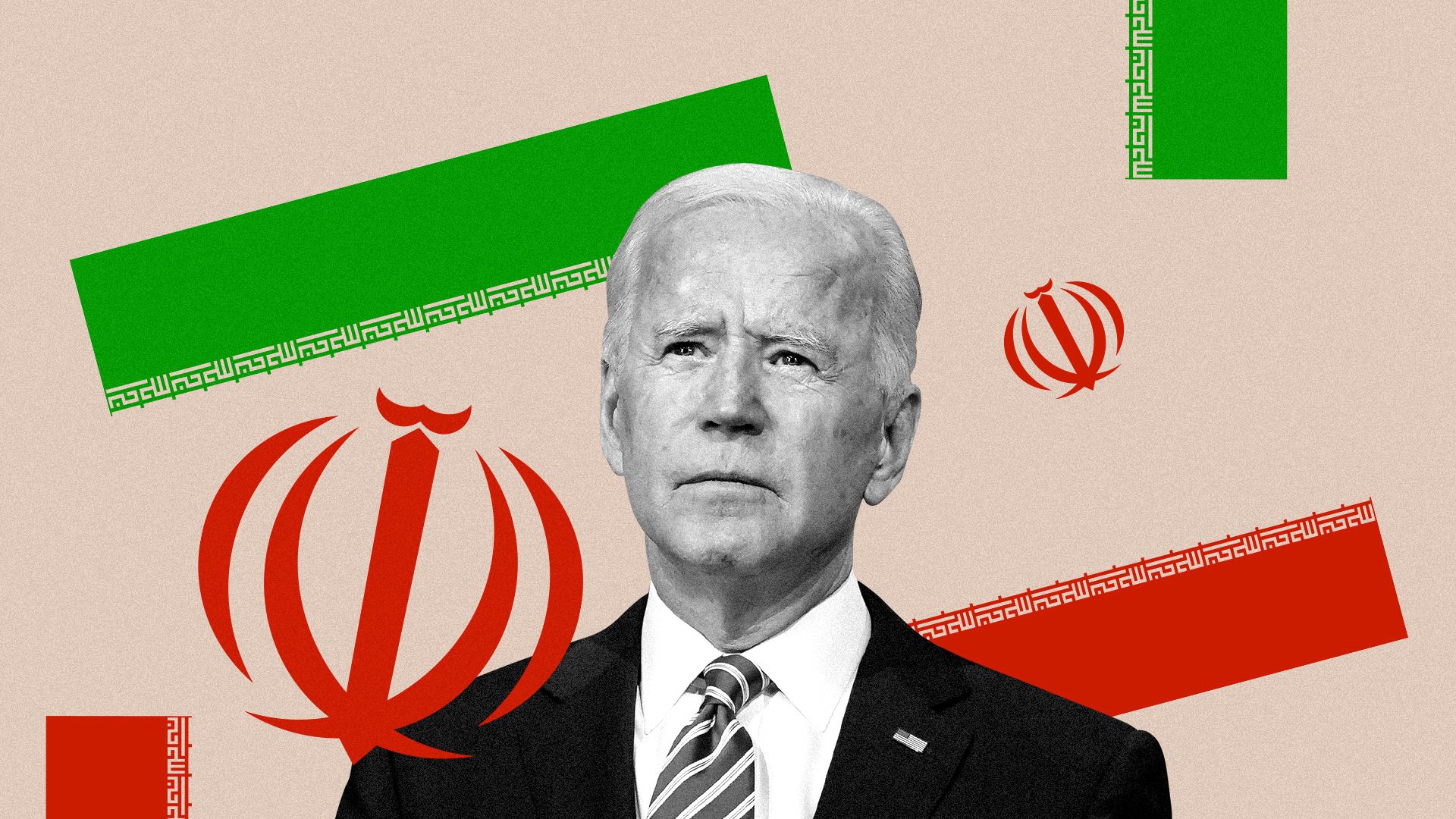 | | | Photo illustration: Aïda Amer/Axios. Photo: Drew Angerer/Getty Images | | | | Four more years of President Trump would almost certainly kill the Iran nuclear deal — but the election of Joe Biden wouldn't necessarily save it. The big picture: Rescuing the 2015 Joint Comprehensive Plan of Action (JCPOA) is near the top of Biden's foreign policy priority list. He says he'd re-enter the deal once Iran returns to compliance, and he'd use it as the basis on which to negotiate a broader and longer-lasting deal with Iran. Breaking it down: Trump withdrew the U.S. from the deal in 2018, restoring U.S. sanctions and piling on new ones under a "maximum pressure" campaign that has devastated the Iranian economy. - He contends that bringing Iran to its knees will eventually bring it back to the negotiating table. That has yet to happen.
- Iran remains a party to the JCPOA but has been systematically breaching it since last May.
- It's not a sprint for the bomb, but Iran has reduced its "breakout time" from one year to perhaps three months.
The European signatories to the deal — France, Germany and the U.K. — have been desperately trying to save it. - One European diplomat told Axios in September that he had one eye on the polls and another on the calendar, anticipating that support would arrive from Washington if the deal could only survive a few more months.
But the Trump administration is attempting to finish off the deal, in part by adding a thicket of sanctions that Biden might find politically painful to remove. - Rob Malley, a former Middle East adviser to Barack Obama and now president of the International Crisis Group, says those efforts will only intensify if Biden wins on Nov. 3.
- "I'm sure there will be people around the president who'd say, 'You are the only thing that stands between a President Biden and undoing everything you did on Iran, and you now have two and a half months to do everything you can to make a return to the JCPOA impossible.'"
Iran's domestic politics may prove more challenging still. The "reformist" administration of President Hassan Rouhani has been badly burned, and hardliners are expected to take over following presidential elections next June. - Foreign Minister Mohammad Javad Zarif says Iran will return to compliance if the U.S. does — but insists Tehran won't consider any additional U.S. demands and expects "compensation" for Trump's sanctions.
- Zarif expressed skepticism last month about the prospects for a follow-on agreement — even one designed only to push back the JCPOA's sunset clauses. "We spent more time negotiating those limitations than anything else," he told the Council on Foreign Relations.
Where things stand: "There are obstacles — demands that Iran might make, our own politics, the more complicated relationship that the U.S. now has with Russia and China — so this is not going to be smooth sailing," Malley says. - Nonetheless, he continues, "the gravitational pull is towards a return to the JCPOA."
|     | | | | | | 2. Interview: Moniz on putting the deal back together | 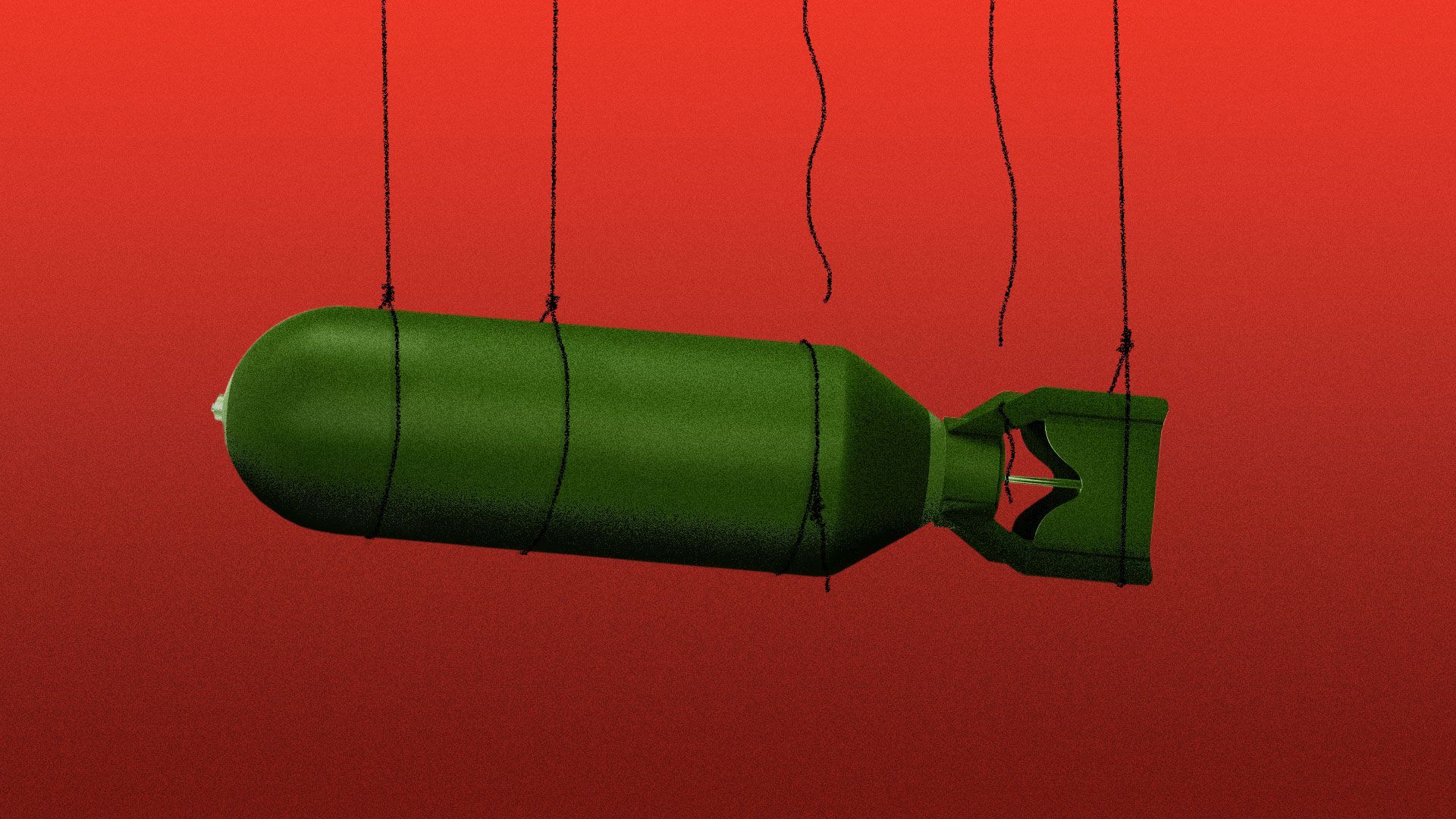 | | | Illustration: Aïda Amer/Axios | | | | It took Iran about six months to come into compliance with the JCPOA the first time says Ernest Moniz, the former energy secretary who played a key role in negotiating that deal. - Now that "the playbook has already been run" and Iran has less to dismantle, it could be accomplished in about four months, he says. That would require help from Russia, which was critical to the 2015 process.
That means the earliest Iran could return to compliance would be right around the time its next administration takes office. - "A serious negotiation of JCPOA-plus probably has to wait for the new president," Moniz says, noting that new negotiations would require the approval of Supreme Leader Ayatollah Ali Khamenei.
- "A new president in both places is probably what is needed, at least potentially, to get the nod from the supreme leader in Iran," he says.
The big picture: Moniz says a revitalized JCPOA would provide the world with confidence that Iran is not building a nuclear weapons program — its original purpose — but would be insufficient. - While verification measures would remain in place indefinitely, limitations on Iran's nuclear material and facilities will lapse over the next several years.
- A cap on Iran's supply of low-enriched uranium — "the single biggest nuclear constraint," in Moniz's view — expires in 2030.
In future negotiations, Moniz adds, "regional concerns will have to be more front and center." |     | | | | | | 3. What to watch: Two paths forward | 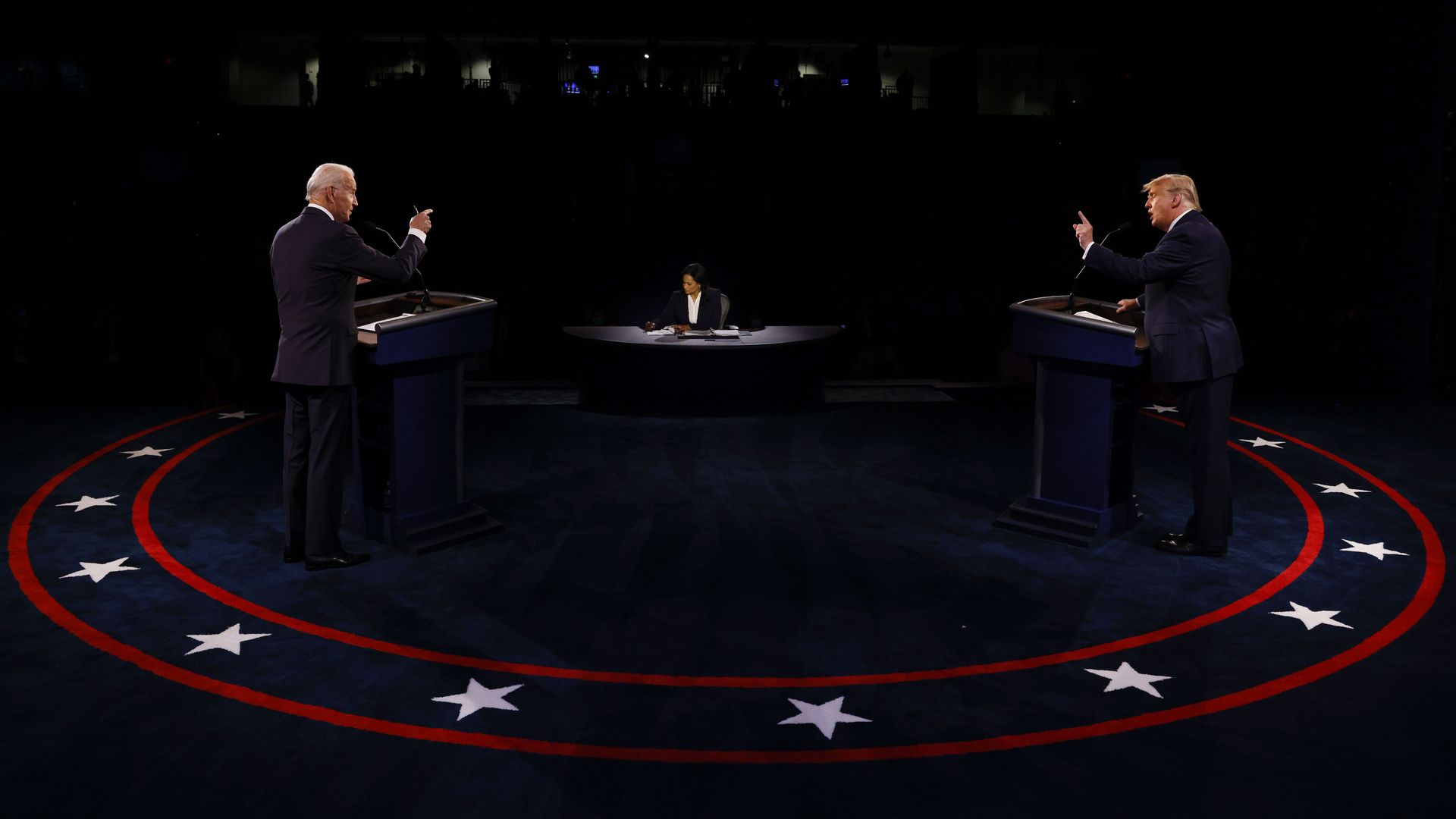 | | | Photo: Jim Bourg-Pool/Getty Images | | | | Israeli Prime Minister Benjamin Netanyahu was one of the loudest and most influential critics of the 2015 deal. - He has declined to speculate on what a potential Biden victory would mean for U.S. policy on Iran, instead staying silent and hoping for a Trump victory, Axios' Barak Ravid reports.
- But the Israelis, Saudis and Emiratis would oppose a return to the JCPOA, Malley says. They object to the fact that the deal doesn't constrain Iran's missiles, its proxy forces or its broader regional activities.
The Trump administration has demanded Iran negotiate on all of those fronts as part of any deal — and claims it will be forced to if Trump is re-elected. - "We are at the moment where the Iranians will recognize, because they can't take four more years of this, they will have to enter into a negotiation," Elliott Abrams, Trump's Iran envoy, recently told CNN.
What to watch: Biden envisions almost precisely the opposite path to a broader deal with Iran, but acknowledges there's no guarantee Iran will even return to compliance with the JCPOA. - As with many other issues, his campaign emphasizes the need to restore America's credibility and its alliances.
- "If Iran decides not to do it, well, I think the world would be able to address that together," Tony Blinken, Biden's top foreign policy adviser, told the "Pod Save the World" podcast this week.
- "And if Iran does engage in this, then at least we'd be back with the folks who helped us achieve the deal in the first place."
Go deeper: Biden's allies-first approach to China |     | | | | | | A message from Celadon Books | | Undaunted by John Brennan, former director of the CIA | | |  | | | | Hailed by The New York Times as "a rich portrait of his unusual life" and by The Washington Post as "a headstrong and unapologetic book, one whose author tells us what he really thinks," Brennan's brutally honest memoir is available now in hardcover, ebook, and audiobook (read by the author). Buy now | | | | | | 4. Global news roundup | 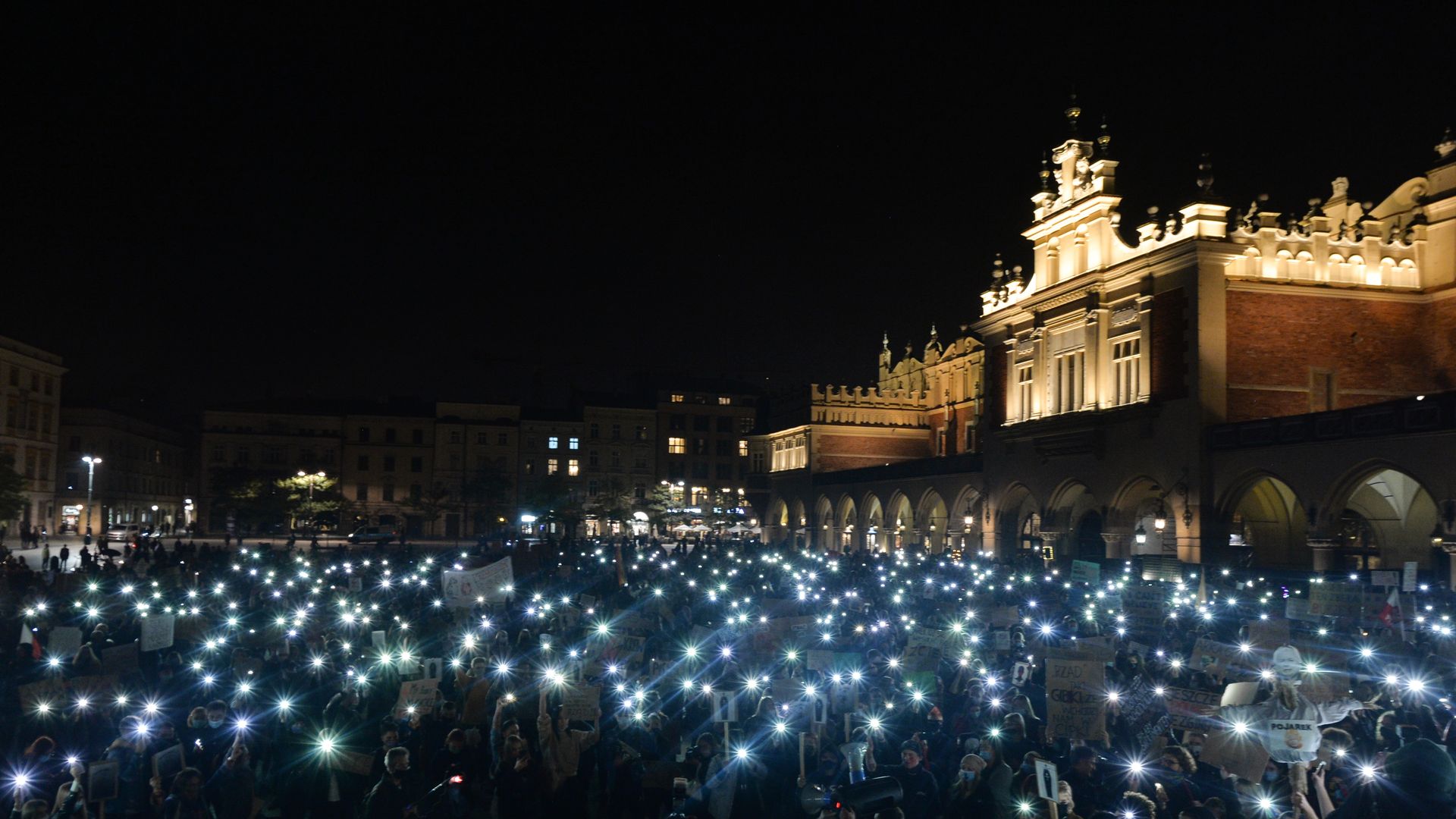 | | | Protests in Krakow. Photo: Artur Widak/NurPhoto via Getty | | | | 1. Facing record-high coronavirus cases, France and Germany are both closing bars and restaurants nationwide while keeping schools open — a reversal of the approach taken by many parts of the U.S. - German hospitalizations have doubled in the last 10 days.
- Dutch hospitals "have reached their limits" and they're sending patients to Germany, Reuters reports.
- Belgium has the highest coronavirus infection rate in the EU but has struggled to coalesce around a strong national response, AP reports.
- Russia says hospital beds are at 90% of capacity in 16 of its regions. The country imposed a mask mandate Tuesday.
2. Massive protests over a court ruling banning abortion in nearly all cases have shaken Poland's conservative and Catholic authorities. - President Andrzej Duda reversed his position on the ruling, which would ban abortion even in cases of serious congenital defects. "It cannot be that the law requires this kind of heroism from a woman," he said.
- "Poland's most powerful politician, ruling party leader Jaroslaw Kaczynski, called for his supporters to turn out on the streets to defend churches after women disrupted Masses last Sunday and spray-painted churches," per AP.
3. Facebook, Twitter and WhatsApp were all blocked on the eve of Tanzania's presidential election, which President John Magufuli is expected to win. - Bulk text messages and any texts that even mentioned the name of opposition candidate Tundu Lissu were blocked. U.K.-based Vodafone complied with that dystopian policy, the Telegraph reports.
- Lissu has said he won't accept the results of the election.
4. The U.S. was the "sole remaining country to voice opposition" to the appointment of former Nigerian Finance Minister Ngozi Okonjo-Iweala as chief of the World Trade Organization on Wednesday, WSJ reports. - "Dozens of governments swiftly spoke out against the U.S., saying Washington was trying to obstruct and weaken the global-trade regulator."
|     | | | | | | 5. Africa's missing recovery funding | 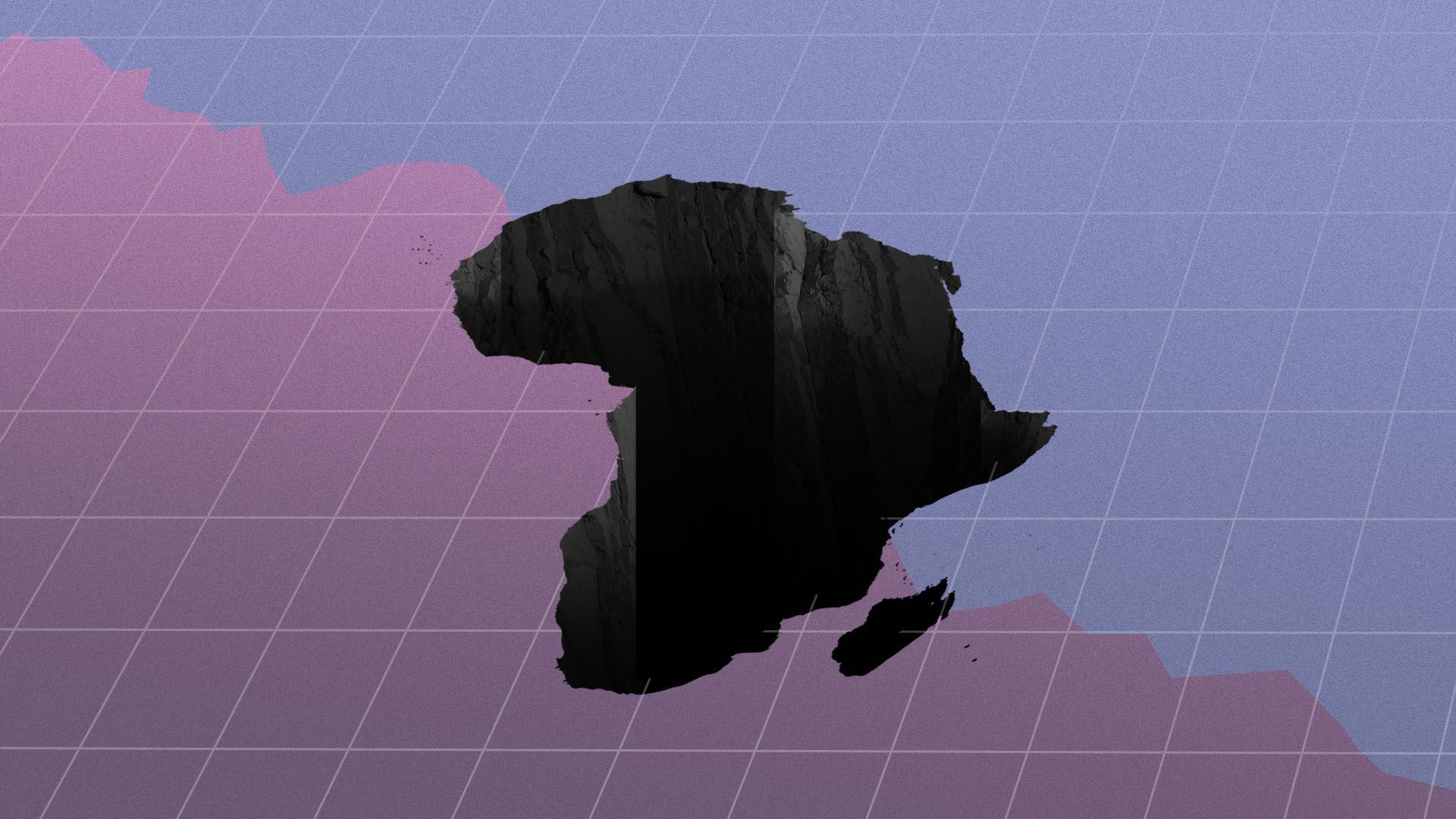 | | | Illustration: Sarah Grillo/Axios | | | | Most of Africa has done surprisingly well in terms of COVID-19 cases and deaths. The bad news is that the pandemic has greatly exacerbated a continent-wide economic crisis, Axios' Felix Salmon writes. Why it matters: There's not remotely enough money to help finance a recovery. Breaking it down: The U.S. might be behind epidemiologically, but it has a huge advantage economically. Like other rich virus-hit countries in Europe, it can respond to the crisis by borrowing as much money as it needs. - African countries, by contrast, have lost their market access, and one of them — Zambia — has already defaulted on its bonds as a result.
- Zero sub-Saharan African countries have managed to issue an international bond since the crisis hit, according to data from Dealogic.
- IMF managing director Kristalina Georgieva estimates that Africa has an eye-popping funding gap of $345 billion between now and 2023.
 Data: Dealogic; Chart: Andrew Witherspoon/Axios The lack of money means a lack of growth. - The IMF forecasts that Africa will grow by just 3% in 2021. That's well below the expected global growth rate of 5.2%.
|     | | | | | | 6. Behind the scenes: Mnuchin's awkward encounter | 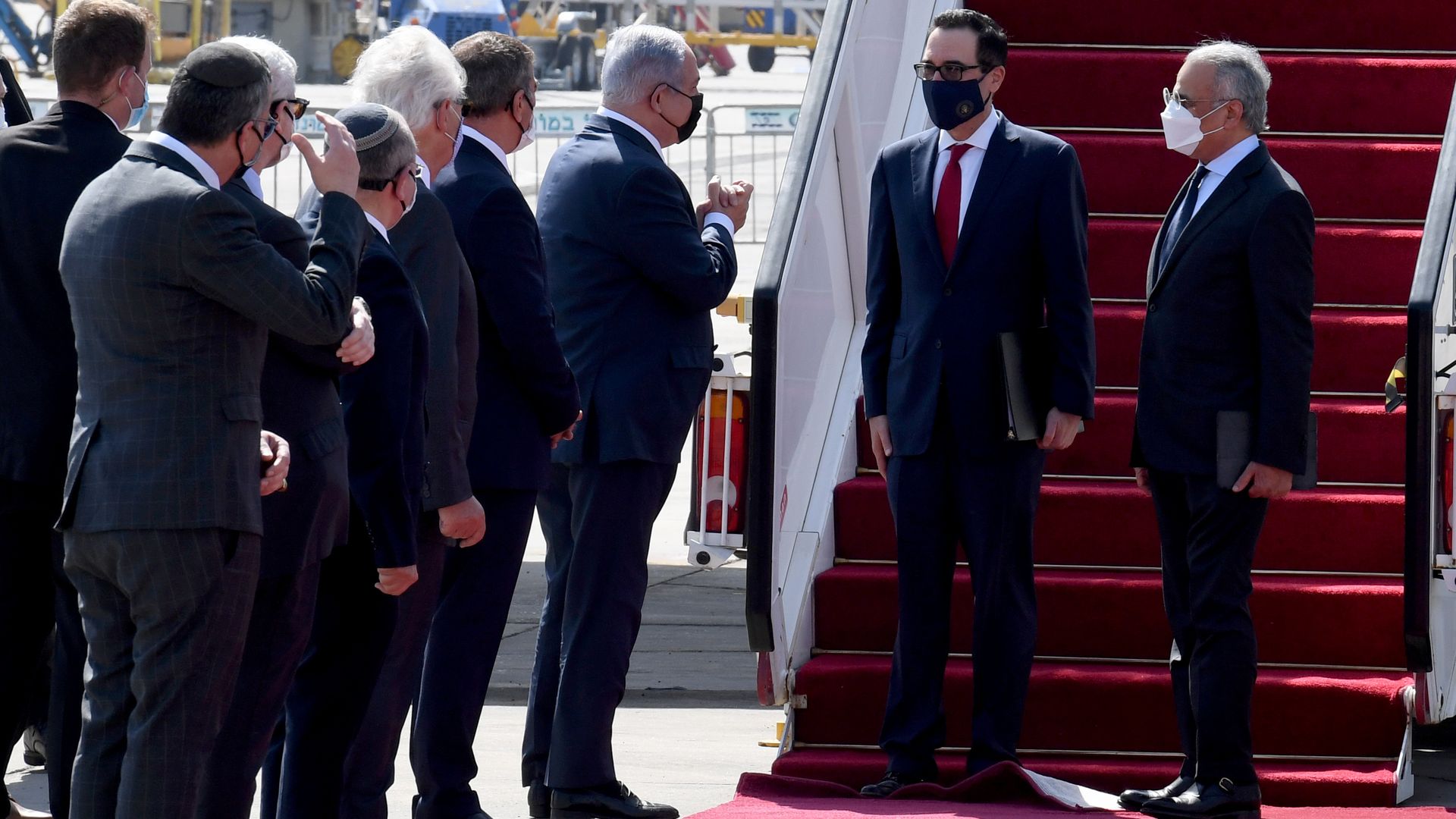 | | | Mnuchin arrives in Israel from the UAE. Photo: Matty Stern/U.S. Embassy Jerusalem/Handout via Getty | | | | Treasury Secretary Steve Mnuchin was confronted by Yitzhak Rabin's daughter last week after a speech in which he gave a historical overview of the Arab-Israeli peace process but seemed to overlook the role of the late Israeli prime minister, Axios' Barak Ravid scooped in his Axios from Tel Aviv newsletter. Between the lines: Rabin is quite a major figure to leave out. He's remembered for making peace with Jordan, sealing the Oslo Accords with the Palestinians, and establishing relations with Morocco, Oman and Tunisia. - The omission may have been unintentional, but it stunned at least one attendee: Dalia Rabin, the late prime minister's daughter, according to a person who discussed it with her.
- She approached Mnuchin immediately after the speech, asking why he failed to mention her father and whether he thinks her father's work for peace was unimportant.
- A surprised Mnuchin told her, "This was my speech and I don't owe you any explanations."
What they're saying: Mnuchin didn't realize he was speaking with Rabin's daughter, according to assistant secretary of the Treasury for Public Affairs Monica Crowley. Worth noting: Next week, Israel will commemorate the 25th anniversary of Rabin's assassination by an Israeli terrorist who opposed the Oslo Accords. Subscribe |     | | | | | | 7. Stories we're watching |  | | | Under the volcano, in Cholula, Mexico. Photo: Hector Vivas/Getty Images | | | - 3 dead after "terror attack" in Nice
- FBI arrests 5 alleged Chinese agents
- U.S. election will shake up Israeli politics
- Corbyn suspended by Labour over anti-Semitism report
- Secret Israel-Sudan contacts enabled deal sealed by Trump
- Japan's big coal rethink
- Giant reef discovered off Australia
Quoted: "By attacking Islam, clearly without having any understanding of it, President Macron has attacked & hurt the sentiments of millions of Muslims in Europe & across the world." — Pakistani Prime Minister Imran Khan on what he considers an Islamophobic French response to recent terror attacks. "They came to help us when we were at rock bottom, and so we are really grateful to the Chinese government." — Khan in January, when pressed as to why he had refused to criticize China for the mass internment of Uighur Muslims. He previously said he didn't know much about the situation in Xinjiang. |     | | | | | | A message from Celadon Books | | Former CIA director pulls back the curtain in his new memoir | | |  | | | In Undaunted, former CIA director John Brennan offers a rare behind-the-scenes look at Russia's interference in the 2016 election, the 9/11 terrorist attacks, the hunt for Bin Laden, the Obama administration's drone policy, and many other crucial moments in recent US history.
Learn more. | | | | | | Axios thanks our partners for supporting our newsletters.
Sponsorship has no influence on editorial content. Axios, 3100 Clarendon Blvd, Suite 1300, Arlington VA 22201 | | | You received this email because you signed up for newsletters from Axios.
Change your preferences or unsubscribe here. | | | Was this email forwarded to you?
Sign up now to get Axios in your inbox. | | | | Follow Axios on social media:    | | | | | |
Post a Comment
0Comments